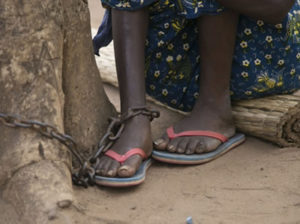‘Shackling’ of mentally ill in Africa must end – Survivor
 Benjamin Ballah was 23 years old and suffering from severe depression when he spent almost a year chained to a log at a faith healing centre in Liberia, unable to move, half-starved and often whipped.
Benjamin Ballah was 23 years old and suffering from severe depression when he spent almost a year chained to a log at a faith healing centre in Liberia, unable to move, half-starved and often whipped.
“They gave us holy water, something called devil’s incense, and sometimes they whipped us – these were the kinds of treatments,” the soft-spoken Ballah told dpa by phone from Monrovia. “Devil’s incense was a liquid, they knocked you down and put it in your nostril, it was very painful.”
As horrific as it is, Ballah’s story is far from unique, with many mentally ill people across Africa suffering similar abuses – some kept in shackles for decades.
And the situation has only been made worse by the COVID-19 pandemic, both Human Rights Watch (HRW) and the World Health Organization (WHO) said in new reports released to mark World Mental Health Day on Saturday.
“While COVID-19 has exposed the importance of psychological well-being … it has exacerbated the risk to people with psychosocial disabilities,” according to the HRW report “Living in Chains.”
“In many countries, COVID-19 has disrupted mental health services, which can put people with psychosocial disabilities at risk of being shackled,” it added.
For its part, the WHO said that while wealthy countries were managing to continue to provide mental health services during the pandemic through helplines and online therapy, poorer nations were falling through the cracks.
HRW spoke to shackled patients, their families and carers in Ghana, Nigeria, Sierra Leone, Mozambique and other countries, finding that often a belief that the mentally ill are possessed by evil spirits leads to the brutal treatment they endure.
There is no exact data on how many people in African countries are kept chained up, mainly because governments don’t collect it, and so many are kept out of sight.
However, in Somalia alone, HRW says, data shows 1,700 people were freed from chains between 2007 and 2010 after an initiative was taken to do so.
And in Ghana, Dr Akwasi Osei, who heads the national Mental Health Authority, told dpa that authorities recently freed 17 shackled people from a prayer camp.
These prayer camps are common in Ghana, with desperate families dropping off mentally ill relatives there to be cared for by Christian pastors and self-proclaimed prophets who see common illnesses such as schizophrenia as evidence of possession or witchcraft.
Many in the prayer camps are kept in pitiful conditions, Osei said by phone from Accra, noting that often “the patient has chains nailed to trees” in the bush and sleeps in the open.
The Ghanaian government is focusing on educating people about mental health, he says, because families usually don’t shackle their relatives “out of malice,” but because of superstition and a lack of understanding and resources.
“They think maybe the illness is coming from spiritual factors … there’s a stigma,” he said.
Adding to that is the fact that Ghana has some 40 psychiatrists for a population of about 40 million. According to HRW, “in Africa, on average, there is fewer than one mental health worker per 100,000 people, compared to 50 in Europe.”
In the prayer camps and other facilities across Africa run by both Christian and Islamic organizations, mentally ill patients told HRW of sexual abuse, beatings, starvation and a lack of hygiene to the extent they live naked in their own excrement.
“I’ve been chained for five years. The chain is so heavy. It doesn’t feel right; it makes me sad,” Paul, a Kenyan man chained in a faith-healing institution, told HRW.
In Nigeria, Mudinat, a chained woman, described the conditions to HRW researchers. “I go to the toilet in nylon bags, until they take it away at night. I last took a bath days ago. I eat here once a day. … I hate the shackles.”
Feira, a woman living with mental illness in Mozambique, told HRW how she was treated by a faith healer: “They cut my wrists to introduce medicine and … a witch doctor made me take baths with chicken blood.”
But it’s not only at rudimentary bush camps run by religious organizations where the mentally ill in Africa suffer abuse.
In Sierra Leone, until as late as 2018, the country’s only mental health facility asked patients to pay for a padlock and chain before they were admitted, according to HRW.
And even South Africa, the continent’s most developed country and one of the richest, has not been immune to scandals related to the treatment of some of society’s most vulnerable members.
There was outrage in the country after over 140 psychiatric patients died after being transferred from a licensed care home to unregistered charities in 2016. A subsequent investigation into the deaths found that many of them later died from starvation, dehydration and cold at the facilities.
Ballah in Monrovia finally left the church and got professional help, was put on medication, finished his university studies and now works as a teacher and mental health advocate.
“Liberia has gone through lots of traumatic events – civil war, Ebola and now Covid-19,” he told dpa. “These events are enough to create a lot of mental health conditions.”
The practice of shackling, however, must stop, he said. “We have other ways of getting people better.”
Source: GNA
